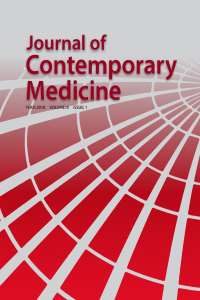Absans Epilepsi Modeli Olan Waj/Rij Sıçanlarda Duloksetinin ECoG Aktivitesi Üzerine Etkisi
Duloksetin, Absans Epilepsi, Waj/Rij Sıçan, ECoG, Açık Alan Testi
The effect of duloxetine on ECoG activity of absence-epilepsy model in WAG/Rij rats
Duloxetine, Absence Epilepsy, Waj/Rij Rat, ECoG, Open Field Test,
___
- 1- Zupec-Kania BA, Spellman E. An overview of the ketogenic diet for pediatric epilepsy. Nutr Clin Pract. 2009;23(6):589-596.
- 2- Barry JJ, Ettinger AB, Friel P, et al. Consensus statement: the evaluation and treatment of people with epilepsy and affective disorders. Epilepsy Behav 2008;13(Suppl. 1): S1–29.
- 3- Tellez-Zenteno JF, Patten SB, Jetté N, et al. Psychiatric comorbidity in epilepsy: a population-based analysis. Epilepsia 2007;48:2336-2344.
- 4- Sillanpää M, Schmidt D. Natural history of treated childhood-onset epilepsy: prospective, long-term population-based study. Brain 2006;129(Pt 3):617-624.
- 5- Cardamone L, Salzberg MR, O'brien TJ, Jones NC. Antidepressant therapy in epilepsy: can treating the comorbidities affect the underlying disorder?. British J Pharmacol 2013;168(7):1531-1554.
- 6- Citraro R, Leo A, De Fazio P, et al. Antidepressants but not antipsychotics have antiepileptogenic effects with limited effects on comorbid depressive‐like behavior in the WAG/Rij rat model of absence epilepsy. Br J Pharmacol 2015;172(12):3177-3188.
- 7- Esen M, Aygun H. The effect of duloxetine on penicillin-induced epileptiform activity in rats. Neurological Res 2019;41(4):298-305.
- 8- Wong DT, Bymaster FP, Mayle DA, et al. LY248686, a new inhibitor of serotonin and norepinephrine uptake. Neuropsychopharmacol 1993;8(1):23–33.
- 9- van Luijtelaar G, Zobeiri M. Progress and outlooks in a genetic absence epilepsy model (WAG/Rij). Curr Med Chem 2014;21:704–721.
- 10- Sarkisova K, van Luijtelaar G. (2011) The WAG/Rij strain: a genetic animal model of absence epilepsy with comorbidity of depression. Prog Neuropsychopharmacol Biol Psychiatry In press.
- 11- Aygun H, Aydin D, Inanir S, Ekici F, Ayyildiz M, Agar E. The effects of agomelatine and melatonin on ECoG activity of absence epilepsy model in WAG/Rij rats. Turkish J Biology 2015;39: 904-910.
- 12- Aygun H, Ayyildiz M, Agar E. Swimming exercise decreases the absence-like epileptic activity in WAG/Rij rats. Behav Brain Res 2019;363:145-148.
- 13- Jobe PC, Browning RA. The serotonergic and noradrenergic effects of antidepressant drugs are anticonvulsant, not proconvulsant. Epilepsy Behav 2005;7(4):602e619
- 14- Santos Jr JG, do Monte FH, Russi M, et al. Proconvulsant effects of high doses of venlafaxine in pentylenetetrazole-convulsive rats. Braz J Med Biol Res 2002;35(4):469-472.
- 15- Borowicz KK, Gołyska D, Luszczki JJ, et al. Effect of acutely and chronically administered venlafaxine on the anticonvulsant action of classical antiepileptic drugs in the mouse maximal electroshock model. European J Pharmacol 2011;670(1):114-120
- 16- Ahern TH, Javors MA, Eagles DA, et al. The effects of chronic norepinephrine transporter inactivation on seizure susceptibility in mice. Neuropsychopharmacol 2006;31:730–738.
- 17- Kruse SW, Dayton KG, Purnell BS, et al. Effect of monoamine reuptake inhibition and α1 blockade on respiratory arrest and death following electroshock‐induced seizures in mice. Epilepsia 2019;60(3):495-507.
- 18- Zomkowski AD, Engel D, Cunha MP, Gabilan NH, Rodrigues ALS. The role of the NMDA receptors and L-arginine–nitric oxide-cyclic guanosine monophosphate pathway in the antidepressant-like effect of duloxetine in the forced swimming test. Pharmacol Biochem Behav 2012;103(2):408-417.
- 19- Sun YH, Dong YL, Wang YT, et al. Synergistic analgesia of duloxetine and celecoxib in the mouse formalin test: a combination analysis. PloS one 2013;8(10):e76603.
- 20- Grégoire S, Michaud V, Chapuy E, et al. (2012). Study of emotional and cognitive impairments in mononeuropathic rats: effect of duloxetine and gabapentin. Pain 2012;153(8):1657-1663.
- 21- Cui R, Wang L, Liu L, Ruan H, Li X. Effects of noradrenergic and serotonergic systems on risk-based decision-making and center arena activity in open field in rats. Eur J Pharmacol 2018;841:57-66.
- 22- Sasamori H, Ohmura Y, Yoshida T, Yoshioka M. Noradrenaline reuptake inhibition increases control of impulsive action by activating D1-like receptors in the infralimbic cortex. . Eur J Pharmacol 2019;844:17-25.
- 23- Sarkisova K, Kulikov MA, Kudrin VS, et al. Neurochemical mechanisms of depression-like behavior in WAG/Rij rats. Zh Vyssh Nerv Deiat Im I P Pavlova 2013;63(3):303-315.
- 24- Midzyanovskaya IS, Kuznetsova GD, Coenen AM, et al. Electrophysiological and pharmacological characteristics of two types of spike-wave discharges in WAG/Rij rats. Brain Res 2001;91:62–70.
- 25- Sarkisova KYu, Midzyanovskaya IS, Kuznetsova GD, van Luijtelaar G. The involvement of the brain dopaminergic system in the pathogenesis of absence seizures and depressive-like behavioral alterations in WAG/Rij rats. FENS Abstr 2006;3:A024-29.
- 26- Sarkisova KYu, Kulikov MA, Midzyanovskaya IS, Folomkina AA. Dopamine-dependent character of depressive-like behavior in WAG/Rij rats with genetic absence epilepsy. Zh Vissh Nervn Dejat 2007;57:91–102.
- 27- Depaulis A, van Luijtelaar G. Genetic models of absence epilepsy in the rat. In: Pitkanen A, Schwartzkroin P, Moshe S, editors. Animal models of seizures and epilepsy. San Diego: Elsevier Inc; 2006. p. 233–248.
- 28- Wilner AN, Sharma BK, Thompson A, et al. Diagnoses, procedures, drug utilization, comorbidities, and cost of health care for people with epilepsy in 2012. Epilepsy & Behav. 2014;41:83e90.
- Yayın Aralığı: Yılda 6 Sayı
- Başlangıç: 2011
- Yayıncı: Rabia YILMAZ
Cennet RAGBETLİ, Hüseyin GÜDÜCÜOĞLU, Mehmet PARLAK
Pediatristler için tanı ya da tedavisi zor deri lezyonları
Mehmet KABALCI, Nesimi GÜNAL, Ali BOLAT, Koray DURAL, Berkant ÖZPOLAT
Adnan BARUTÇU, Sevcan ERDEM, Fadli DEMİR, Saliha BARUTÇU, Göksel LEBLEBİSATAN
Böbrek ve Üriner Sistemin Doğumsal Anomalileri: 806 Olgunun Analizi
Ahmet Midhat ELMACI, Muhammet İrfan DÖNMEZ
Absans Epilepsi Modeli Olan Waj/Rij Sıçanlarda Duloksetinin ECoG Aktivitesi Üzerine Etkisi
Acil serviste yapılan bilgisayarlı tomografi görüntüleme istemleri ne kadar etkin?
Özge ÖZKAN YILDIZ, Suna ERAYBAR, Halil KAYA, Erol ARMAĞAN
Tıkayıcı Uyku Apne Sendromlu Olgularda Uyku MRG Ve Uyku Endoskopisi Bulgularının Karşılaştırılması
Volkan ÇAĞLAYAN, Müge ÖZÇELİK KORKMAZ, Şenol CİVELEK
Murat KONAK, Ömer ERDUR, Muhammed Yaşar KILINÇ, Hanifi SOYLU
